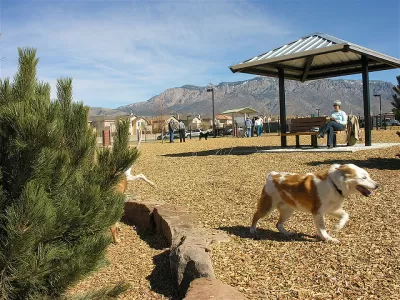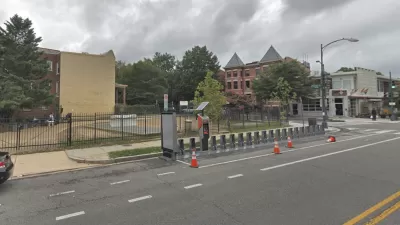"Should DC spend about $2 million on a parcel of land in Columbia Heights to build a dog park?"

Alex Baca and Nick Finio write an opinion piece on the controversial role of dog parks in housing-impacted urban neighborhoods.
In this case, the proposed dog park would be located on an empty 7,335 square-foot parcel owned by the WMATA and located at 11th Street and Park roads NW in Washington, D.C. Empty for 20 years, the WMATA has allowed people to use the parcel as a dog park since 2009.
"WMATA, which still faces budget shortages, is selling surplus land like this parcel to generate more revenue," according to the article. "In May, the DC Council included $1.5 million to purchase the property from WMATA in its FY2019 budget. The market value is estimated to be closer to $2.1 million. Now that it's officially up for sale, dog park users are urging the council to offer to pay the market rate—$2.1 million—to buy the parcel."
Still, the authors consider the proposition of building a dog park with tax payer money is a housing-constrained city to present a moral quandary that they just can't abide. "Despite our affection toward animals, we believe that spending scarce city funds to preserve this particular parcel as as [sic] dog park is a bad idea, particularly if there’s any chance of this land being used to build more homes for people," write Baca and Finio.
FULL STORY: Is it unethical to build a dog park on prime real estate in housing-strapped DC?

Planetizen Federal Action Tracker
A weekly monitor of how Trump’s orders and actions are impacting planners and planning in America.

Maui's Vacation Rental Debate Turns Ugly
Verbal attacks, misinformation campaigns and fistfights plague a high-stakes debate to convert thousands of vacation rentals into long-term housing.

San Francisco Suspends Traffic Calming Amidst Record Deaths
Citing “a challenging fiscal landscape,” the city will cease the program on the heels of 42 traffic deaths, including 24 pedestrians.

Amtrak Rolls Out New Orleans to Alabama “Mardi Gras” Train
The new service will operate morning and evening departures between Mobile and New Orleans.

The Subversive Car-Free Guide to Trump's Great American Road Trip
Car-free ways to access Chicagoland’s best tourist attractions.

San Antonio and Austin are Fusing Into one Massive Megaregion
The region spanning the two central Texas cities is growing fast, posing challenges for local infrastructure and water supplies.
Urban Design for Planners 1: Software Tools
This six-course series explores essential urban design concepts using open source software and equips planners with the tools they need to participate fully in the urban design process.
Planning for Universal Design
Learn the tools for implementing Universal Design in planning regulations.
Heyer Gruel & Associates PA
JM Goldson LLC
Custer County Colorado
City of Camden Redevelopment Agency
City of Astoria
Transportation Research & Education Center (TREC) at Portland State University
Jefferson Parish Government
Camden Redevelopment Agency
City of Claremont





























